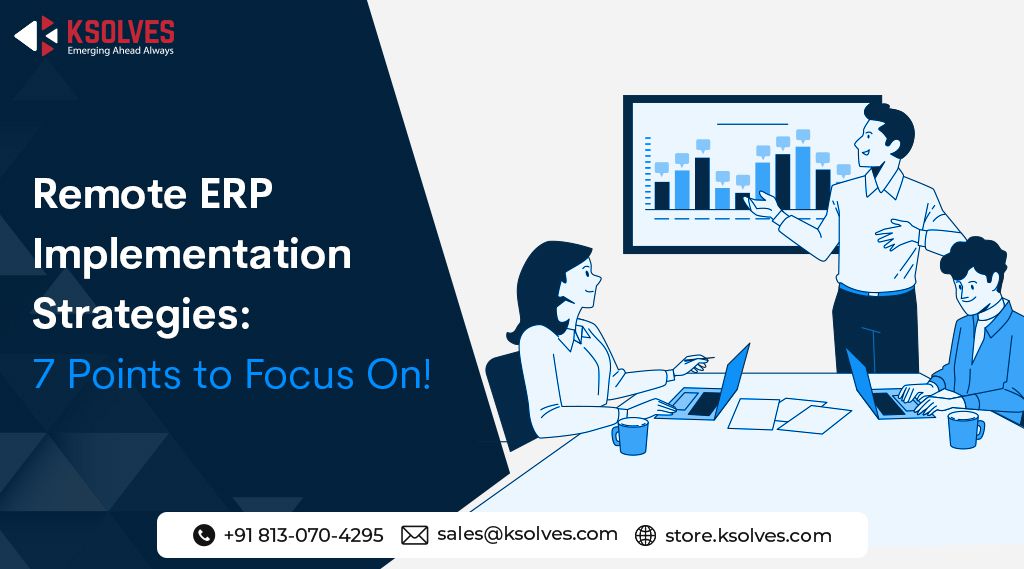Odoo
5 MIN READ
September 13, 2021
![]()

The most attractive benefit of the software domain is that you can attain anything virtually without conventional physical contact. The virtual sphere has now grown leaps & bounds to make anything possible in this technologically evolving world. The possibilities are endless & so is in the case of ERP implementation.
In remote ERP implementation, the biggest advantage is that everything can be done virtually. In place of a face-to-face consultation, we accomplish every step for ERP system implementation virtually & without compromising with the quality. What you receive from a real meeting is assured on the completion of this virtual process.
Like an ERP promises, you can do whatever you want, being at your office’s comfort. The remote implementer of your ERP software will be in contact with you for the successful ending of all procedures in a phased manner, that too without dragging you into any complications.
Let’s now see the seven tips by which you can manage a successful remote ERP implementation
Detailed Analysis
A detailed analysis to know the company’s nature & its existing status is the very first step before starting the remote ERP implementation. It is because the implementer might not know the nature & style of your company that is going to migrate to a new platform. It’ll include processes like checking the current reports, the company’s hierarchical order, future expansion plans as well as strength, and working models.
The Commencement
The process for remote implementation of the ERP, as anyone can guess, starts with the virtual meeting. In this meeting, the clients tell their requirements to the implementer. For the best ERP that suits every industry well, you can go for Odoo ERP implementation. It believes in having such successful virtual meetings with clients & understands their actual requirements before proceeding to the next part. Their video conference mostly focuses on understanding their clients’ requirements in the best way possible. There might be multiple sessions required to learn the nature and working style of a specific company that has decided to shift its operations to the ERP software.
Workflow Templates
In the remote session of ERP implementation, everything needs to be scheduled properly for effective task completion on time. The adopted strategy here is to note down everything for the process in the chart form for better understanding & communication. Creating workflow templates, metadata templates and security templates will make this process easy, and effortless exchange of data and ideas will result in better interaction & implementation. The hours of remote working will be clear and defined in order to complete the assignment at the earliest and ensure seamless coordination between both parties.
Pilot Conferences
This is the significant part of the ERP system implementation remotely where one team constantly scrutinizes the process. At this point, the supervision process takes place. The members of this team will interact to instantly address all the requirements, clarifications, or complaints. They will virtually share the screen to directly monitor the ERP implementation process. In addition to that, this team will be responsible for all the daily & monthly observations of the status.
Live Assistance
Out of the key fascinations of the remote implementation of the ERP system, one is go-live support. The team members trained in data migration & related services will come live in their virtual office for spot assistance. Therefore, the clients can access the technical support & guidance by them all through the working hours. The senior members of the ERP implementation team will be there for supervising their subordinates & holding talks with the enterprise heads over any topic. Separate meetings will be conducted with the heads of various verticals for functional inspections & to perform the needed actions.
Testing to Perfection
An ERP will come into action after multiple rounds of testing & trials. In the process of implementing ERP solutions remotely, an expert team will follow up with a planned approach. After all such sessions, the troubles or errors will get noted for quick correction. Online training sessions and proper training videos will be provided to the clients so that they become fully comfortable with their new ERP system. A basic module for training will be given as well upon completion of the process of ERP implementation, as it will be useful for the speedy reference of any expert in the industry.
Handing Over of Project and Review
The final part is the handing over of your ERP software successfully after the data migration and required ERP modules’ integration. Upon completion of the ERP implementation process, there will be one final virtual meeting round to explain everything & settle any doubts. Even after this formal handing over part, there will be effortless support by the technical team for assisting the clients.
Conclusion
In comparison to the conventional, physical ERP implementation process, the remote alternative comes out to be a cost-effective solution and will reflect the actual essence of the technology-driven industrial world of the 21 century. At Ksolves, you will get excellent assistance in implementing ERP solutions, and our customer service is open 24/7 for the clients to interact with our technical team & instantly address any of their concerns. Call us anytime at your comfort!
Email: sales@ksolves.com
Call : +91 8130704295
![]()